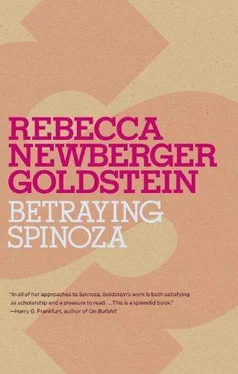Rebecca Goldstein - Betraying Spinoza - The Renegade Jew Who Gave Us Modernity
Здесь есть возможность читать онлайн «Rebecca Goldstein - Betraying Spinoza - The Renegade Jew Who Gave Us Modernity» весь текст электронной книги совершенно бесплатно (целиком полную версию без сокращений). В некоторых случаях можно слушать аудио, скачать через торрент в формате fb2 и присутствует краткое содержание. Год выпуска: 2009, ISBN: 2009, Издательство: Random House, Inc., Жанр: Биографии и Мемуары, на английском языке. Описание произведения, (предисловие) а так же отзывы посетителей доступны на портале библиотеки ЛибКат.
- Название:Betraying Spinoza: The Renegade Jew Who Gave Us Modernity
- Автор:
- Издательство:Random House, Inc.
- Жанр:
- Год:2009
- ISBN:978-0-80524273-7
- Рейтинг книги:5 / 5. Голосов: 1
-
Избранное:Добавить в избранное
- Отзывы:
-
Ваша оценка:
- 100
- 1
- 2
- 3
- 4
- 5
Betraying Spinoza: The Renegade Jew Who Gave Us Modernity: краткое содержание, описание и аннотация
Предлагаем к чтению аннотацию, описание, краткое содержание или предисловие (зависит от того, что написал сам автор книги «Betraying Spinoza: The Renegade Jew Who Gave Us Modernity»). Если вы не нашли необходимую информацию о книге — напишите в комментариях, мы постараемся отыскать её.
Betraying Spinoza: The Renegade Jew Who Gave Us Modernity — читать онлайн бесплатно полную книгу (весь текст) целиком
Ниже представлен текст книги, разбитый по страницам. Система сохранения места последней прочитанной страницы, позволяет с удобством читать онлайн бесплатно книгу «Betraying Spinoza: The Renegade Jew Who Gave Us Modernity», без необходимости каждый раз заново искать на чём Вы остановились. Поставьте закладку, и сможете в любой момент перейти на страницу, на которой закончили чтение.
Интервал:
Закладка:
Of course, what seem like inconsistencies are nothing new to you, girls. You know much better than that. You know that sometimes the Torah teaches us through what seem like contradictions. The Torah has endless ways of teaching us, and the appearance of inconsistency itself transmits knowledge. Rashi and the other commentators explicate all this for us, she said, mentioning the famous acronym for Rabbi Solomon ben Isaac (1040–1105), the leading exegete of Torah and Talmud of all times, at least for the Orthodox. We had been learning Rashi’s commentaries since elementary school.
But Spinoza had the arrogant love of his own mind, Mrs. Schoenfeld continued, and he seized on these apparent contradictions so that he would not have to recognize the authority of any mind over his, not even Ha-Shem ’s.
Atheism always comes down to arrogance. Remember that, girls. It might dress itself up as careful thinking, but underneath it is the vanity and arrogance of thinking that human beings are the highest forms of intelligence in the universe.
However, continued Mrs. Schoenfeld, Spinoza did retain one Jewish virtue, and a very important one at that: Respect for his parents. Just think about that for a moment, girls. Even a man like that, completely godless, still honored his parents. He waited until both his parents had passed away before he revealed his apikorsus . His mother had died when he was a young boy. He had been brought up by a stepmother. By the year of his excommunication, 1656, she, too, had died, as had his father. In fact, he had only sat shiva for his father a year before he was put into kherem . He had followed exactly the prescribed mitzvahs for mourning a parent, going every day to the synagogue, saying Kaddish. And while his father lived, he had kept his silence because of shalom bayis .
Shalom bayis means peace within the household, within the family. It was an exceedingly familiar phrase to all of us. So important is shalom bayis , so constitutive of the Jewish way of life, that sometimes, for its sake, you can do things that otherwise wouldn’t be allowed. For example, say a Talmudic scholar, who ought to be devoting his hours to study, has a wife who doesn’t see the point of a devotion that keeps him away both from the house and from a good parnosa , or living. She doesn’t recognize that to “sit and learn,” as the expression goes, is the most sanctified activity in which her husband can engage. For shalom bayis , the man can forsake his studying, as he himself will know if he is a true scholar, a talmid khokhem , which in Judaism entails not only intellectual but moral merit. A talmid khokhem will know the fundamental importance of a household free from resentment, rancor, discord: he will sacrifice even learning Torah for the sake of shalom bayis .
Mrs. Schoenfeld’s choice of this particular phrase suddenly brought the story of Baruch Spinoza home to me in a startlingly immediate way. All along, I had listened with special interest to this tale of a man whose trajectory of philosophical reasoning had brought him into disastrous collision with his close-knit Jewish community, a collision that inaugurated this intriguing thing called “modernity,” of which I was uncertain whether to approve or disapprove.
But now, with this phrase, Spinoza burst into vivid life before me. It was as if I suddenly knew him, knew the manner of person he was. I certainly felt that I understood him better than I did those bumulkes lurking around the kosher pizza shop. “That’s how it was,” I thought, with that familiar phrase peircing me inside, “that’s how he was.”
He had not wanted to hurt his family by speaking his doubts aloud. Though he was a man who had given himself over entirely to the search after truth — I knew this instinctively — still he would not speak the truth so long as his doing so might hurt those whom he loved.
And from this one fact about Spinoza I knew that Mrs. Schoenfeld was mistaken in thinking that it was his arrogance that explained his departure from Orthodoxy. An arrogant person would not have shown such heightened consideration for others’ sensibilities. He would not have waited until his father had died before revealing how deeply he questioned the beliefs of the fathers. The thought occurred to me that he must have been a lovable man. 12I sat in Mrs. Schoenfeld’s class and I felt that I loved him.
My teacher had tried to make us feel Spinoza’s betrayal as our own, as if we, too, were part of that close-knit community of former Marranos, which in some sense we were. She had tried her best to put the seventeenth-century philosopher into familiar terms, and she had succeeded, though, at least in my case, not exactly as she had intended. Though I could not fathom what his ideas truly were, had no sense of what he might have meant by saying that God was nature, still, I felt that I knew him. An ignorant little girl in a calf-length skirt, I felt myself astonished with the sudden sense of knowing this philosopher, Benedictus Spinoza, who held such a formidable position in a construct of which I had only the dimmest notion: the Western canon.
I remember one more thing that Mrs. Schoenfeld had to say about Spinoza. It was in her summation of him.
There was nothing at all of Yiddishkeit that remained in Spinoza, she said. If you, God forbid, were to read any of his works, you would not find anything that would betray who Spinoza really was, that he had been brought up as a God-fearing Jew, a brilliant student who had once been a favorite of his rabbis, who were themselves great Torah scholars. He had learned to write in the language of goyisha philosophy, Latin, and this language pervades all his thinking, so that none of Torah’s truth could survive in it.
Think about it, girls: If he were a true Jewish thinker, then would he have found his place among the philosophers? If he hadn’t betrayed Yiddishkeit , would the world have called him great?
It would be some years before I would find my way back to Spinoza, even though I did go on to become a professional philosopher. But my studies in philosophy were confined to what is called analytic philosophy, which is generally quite opposed to the very possibility of metaphysics, meaning here by “metaphysics” the attempt to use pure reason (as opposed to experience) to arrive at a description of reality. (“Metaphysics” can be used in a wider, looser sense, referring just to ontological commitments — commitments concerning what sorts of things exist in the world. In the latter sense of “metaphysics,” even analytic philosophers have a metaphysics. The sense in which they reject the very possibility of metaphysics is in the sense of a nonempirical deduction of the nature of reality.)
And Spinoza’s project is metaphysics on a grand scale— the very grandest, in fact. Never had there been quite so ambitious a metaphysical project as Spinoza’s. He is audacious in the claims he makes for pure reason. Logic alone, he argues, is sufficient to reveal the very fabric of reality. In fact, logic alone is the very fabric of reality. And into this fabric are woven not only the descriptive facts of what is , but the normative facts of what ought to be .
In the philosophical tradition toward which I gravitate, such overinflated talk of reality — of, even more preposterously, Reality, and a Reality enriched with ethics, no less — is philosophically absurd. Or, as my old yeshiva mentors would have put it, such talk is assur , forbidden.
The new mentors with which I replaced the likes of Mrs. Schoenfeld might well, much like her, have alluded to Spinoza by way of a cautionary tale, and one, too, that bespeaks a certain arrogant overconfidence in the powers of human reason. Of course, my new teachers wouldn’t be arguing that reason’s powers must be augmented by divine revelation, but rather by observation and scientific explanations. We learn the nature of reality — though that word itself, even uncapitalized, was slightly off-color in the analytic circles I frequented — through the laborious, peer-reviewed, one-step-forward-three-steps-backward collective efforts of science. A project such as that of Benedictus Spinoza’s, metaphysical to the heights, was one upon which I was trained to look askance, as exceeding not just the limits of knowability but the very conditions for meaningfulness. Such a system was composed of not just unsubstantiated speculations, but of highfalutin nonsense. It was presumptuous to think that we might be able to use pure reason to deduce, with absolute certainty, not only the nature of Reality but even the nature of our ethical obligations: how we ought to go about living our lives, what we ought to care about. Such claims impute far too much power to the faculty of reason.
Читать дальшеИнтервал:
Закладка:
Похожие книги на «Betraying Spinoza: The Renegade Jew Who Gave Us Modernity»
Представляем Вашему вниманию похожие книги на «Betraying Spinoza: The Renegade Jew Who Gave Us Modernity» списком для выбора. Мы отобрали схожую по названию и смыслу литературу в надежде предоставить читателям больше вариантов отыскать новые, интересные, ещё непрочитанные произведения.
Обсуждение, отзывы о книге «Betraying Spinoza: The Renegade Jew Who Gave Us Modernity» и просто собственные мнения читателей. Оставьте ваши комментарии, напишите, что Вы думаете о произведении, его смысле или главных героях. Укажите что конкретно понравилось, а что нет, и почему Вы так считаете.












